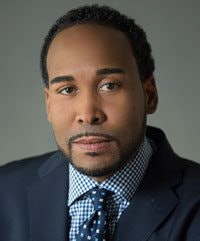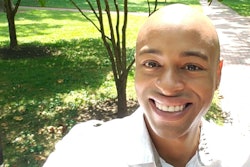At a young age, David J. Johns spent an hour traveling to and from school to receive the quality education that his mother –an impassioned social justice advocate— knew would give him access to opportunities for a better life.
It is his mother and other social activists he has never met who helped him understand that people have to be disruptive and stand in the gaps to fight for certain groups of people, said Johns, who is the newly appointed executive director of the National Black Justice Coalition, a civil rights organization dedicated to the empowerment of Black lesbian, gay, bisexual, transgender and queer (LGBTQ) people, including people living with HIV/AIDS.
 David Johns
David Johns“I’ve now come into a better appreciation for the many ways that social activists as well as intellectual organizers have made sacrifices so that I and my peers can live our purpose and try and show up in the long legacy of freedom fighters that have existed before,” he says.
Now, the Inglewood, California, native says that his work as a social justice advocate and educator for Black LGBTQ people and the Black community is a “responsibility that I accept willingly.”
Johns wants young people to see him as a strong Black man who is equally proud of being Black and same-gender loving , something he did not see when he was younger. Because of this, he says that he refuses to hide parts of who he is or otherwise fail to show up in his fullness.
“I assumed this role because it is my responsibility to show up not just in the work, but to also show up in the world in ways that allow people to make some of these intersectional connections,” he says. “Until we embrace the diversity that makes us strong, we’re going to continue to struggle with some of the same problems that we face.”
Johns will start his directorship at NBJC leading with “aggressive campaigns” that highlight the diversity that exists within the Black community and that curate the stories of the contributions that Black LGBTQ have made in the world. The campaigns will also provide a platform for allies and others to advance the civil rights and equity agenda required to strengthen the Black family, Johns says.
The executive director’s emphasis on intersectionality in the ways he hopes to eradicate racism, sexism, homophobia, transphobia, misogynoir and LGBTQ bias and stigma is his understanding “that none of us are free until all of us are free,” he says. “When America catches a cold, Black America catches the flu. When all of that is happening, Black LGBTQ and same-gender loving America is catching pneumonia.”
Another goal for Johns at NBJC is to use the collective power of the Black community to overcome bias and stigma around HIV/AIDS in order to strategically engage people in meaningful and critical conversations to support those living with the disease. Until this occurs, Johns warns that HIV/AIDS will continue to “ravage our community and rob us of so many of the individuals who otherwise should be leading happy and healthy lives.”
A part of this advocacy work is being mindful of the language used to engage in such conversations around race, gender and disability. The NBJC plans to launch a series of campaigns designed to equip members of the Black community, the media and elected officials with the language needed to thoughtfully discuss opportunities to support Black LGBTQ people in diverse ways. A “Words Matter” campaign will build off of the NBJC’s Health and Wellness initiative and support critical conversations about HIV/AIDS in the Black community.
“Language is an especially powerful tool in disrupting bias and stigma, as well as to facilitate healing,” Johns says. For the LGBTQ community, and transgender people in particular, “being thoughtful about how language allows us to celebrate one’s humanity even when we might not understand it in its fullness” goes a long way to unifying the Black community.
Johns’ work at the NBJC will build on his previous role as the first executive director of the White House Initiative on Educational Excellence for African Americans under former President Barack Obama. The title for the initiative underscores the point that the terms “educational excellence” and “African-Americans” are “barely and infrequently strung together,” Johns says.
“I refuse to let anybody shorten them,” he says. “It’s really changing the way that we engage in and think about what’s possible for Black babies,” he adds.
During his tenure, Johns – who also taught kindergarten and third grade – worked with the presidential advisory committee on four key areas: improving early childhood education and quality care, expanding K-12 opportunities for Black students, accelerating post-secondary education opportunities; and setting the record straight to dispel stereotypes and misunderstandings in education trends.
However, his proudest moment at the White House initiative was the creation of the Af-Am Education Summit in partnership with Ebony magazine. Johns’ initiative produced the summit at more than 50 colleges and universities around the country to provide a platform for young people to share what matters most and what support they would like from concerned adults.
“The one rule at the summit was that the only experts who got to sit on the stage in front of the White House were students themselves,” Johns says. “ We show up at conferences and we’ll read their letters or play videos of them, but seldom do we ever give them the platform and the microphone to speak and then listen to the things that they say matter most to them.”
In addition to his role as executive director at NBJC, Johns is pursuing a doctoral degree focused on sociology and education policy from Columbia University where he previously received a bachelor’s and master’s degree. The program will allow him to reflect on connecting theory to practice and leveraging policy to affect practices in education in ways that benefit the communities “most often neglected and ignored,” he adds.
Often, he finds that adults are more focused on things that do not necessarily concern younger people, and this can be a barrier to a student’s success or even a boundary to affirming a person’s humanity and gender identity.
“We often ask young people to do a whole lot of work, to go figure stuff out, to look stuff up, to make sense of it, but we as adults have a responsibility to do the same thing, especially when it is related to a barrier to the success of our young people,” Johns says, adding that even if someone is not a credentialed educator, it does not mean that they do not have a responsibility to help students.
His advice: “Take the things that you love about the world, and make them accessible to them.”
In his unique position between policy and practice at NBJC, Johns says that he hopes to leave a lasting impact by leading with love and creating spaces for people to thrive, to feel welcome and to be affirmed in their being.
“That will mean that we will make it so that everybody truly has the opportunity to obtain the American dream, to live free of the worry and stress and stigma that too often colors the experiences of those who have skin that’s been kissed by the sun or have unique expressions of love,” he says.
Tiffany Pennamon can be reached at [email protected]. You can follow her on Twitter @tiffanypennamon.















